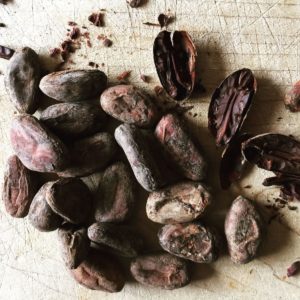The most famous spots for single-origin chocolate are the countries cacao lovers already know well, like Costa Rica, Columbia, Bolivia and the Dominican Republic.
Haiti, a Caribbean island still recovering almost six years after a devastating earthquake in 2010, is not a name that usually comes up.
Singing Rooster, a Madison, Wisconsin, nonprofit formed in 2009, supports the island’s farmers by selling their coffee and artwork. Last fall, Singing Rooster began importing cacao as well from the small country.
Singing Rooster is owned by two entrepreneurs: Molly Nicaise and her husband, Christophe.
“It’s actually pretty rare,” said Corinne Hale, a Singing Rooster coffee ambassador. “Few people know that cacao grows in Haiti.
“That in itself makes it rare and kind of hard to get.”
But that has already started to change. In summer 2014, National Public Radio’s “The Salt” did a story about farmers in Haiti with super-producing cacao trees and the push to turn them into an economic driver.
“Haiti wouldn’t need huge plantations to compete,” Rashmee Roshan Lall reported. “Unlike large, industrialized crops, 90 percent of the world’s cocoa comes from small, family-run farms like the ones Haiti has.”
Still, it’s an uphill battle. Farmers in Haiti, Hale explained, don’t have the usual row-by-row plantations, which makes the picking process more difficult.
The NPR story described “historically low yields and poor farm-to-market infrastructure.” Singing Rooster is working with the farmers to improve both the quality of their cacao and their capacity to process it.
“We used our profits from this past fall selling chocolate and put it back into the farmers by purchasing fermentation tanks,” Hale said. “It has doubled their capacity. Before, they were producing 40 sacks; now it’s up to 80 sacks.”
Read more at www.host.madison.com


